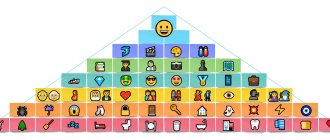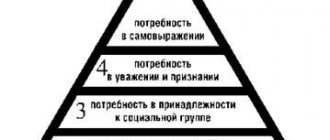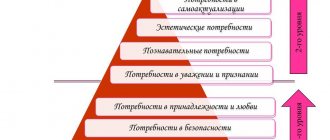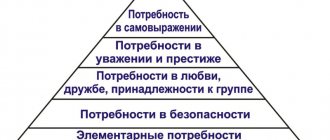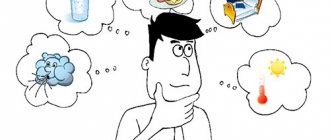Save article:
The article explains:
- The essence of Maslow's concept of needs
- Maslow's principles characterizing human nature
- Highest human needs
- Practical application of Maslow's theory of needs
- Criticism of Maslow's concept of needs
Maslow's needs are the most famous theory of motivation that probably everyone has heard of. The famous pyramid, where needs are in hierarchical order, has become the basis for practical application in various fields and for the construction of new theories. But is it relevant now, or is this theory only in textbooks?
Despite the fact that a number of provisions of Maslow’s theory have been criticized, the approach can still be used both in business and for career or self-development purposes. In our article we will tell you how to apply Maslow’s conclusions in practice, and also analyze his concept as a whole, its strengths and weaknesses.
The need to satisfy physiological needs
The first level of Maslow's pyramid is the level of physiological needs. A person, deprived of food and water, basic means of subsistence and deprived of carnal pleasures, is completely absorbed in caring about satisfying his basic needs. He has no time to think about the fact that there are levels of higher order needs - self-actualization, cognition, aesthetics or recognition. Feeling hungry, he forgets even his own safety. All his thoughts and actions in this case are entirely determined by the instinct of self-preservation - physical hunger, not emotional.
The first level in Maslow's pyramid of human values reflects a pattern. This is by no means a whim or a manifestation of a complete lack of volitional control and indulgence. This is how an urgent physiological need or “physiological urge” manifests itself. A healthy human body independently regulates homeostasis, temperature and blood composition - water-salt, acid-base and protein balance, sugar, fat, calcium and oxygen content, etc. If any nutrients necessary to maintain homeostasis are not enough, a person feels “partial hunger for a missing element”, manifested as a specific appetite. In such a situation, “... the body directs all its capabilities to satisfying hunger, its effectors and receptors, memory, mind and habits become tools for satisfying hunger. ... Then the passion for yellow shoes and interest in native history fade or disappear altogether.”
A person eats to get rid of the feeling of emptiness in the stomach. But, Maslow agrees, this is the main, but not the only reason. He also eats because the feeling of fullness allows him to indirectly satisfy his needs for comfort and safety. Also, a person can be motivated to make love not only by the desire to free himself from sexual dissatisfaction, but also by the desire to satisfy his need for warmth, sympathy or power, the motive to feel more confident, more significant, stronger.
The need for food, Maslow is sure, changes the personal philosophy of the future. For a person tormented by hunger, heaven becomes a place where food is available without restrictions. At such moments, he sincerely believes that this is what human happiness consists of. Freedom, love, respect, brotherhood turn into an empty phrase for the hungry man, for he “lives by bread alone.” On the other hand, regular satisfaction of physiological needs opens up opportunities for a person to satisfy the needs of a social level. But only as long as the first ones are satisfied.
Company's secret
Information security is usually associated with some secret information that can make a competitor richer. I think that in our reality there cannot be a single secret that would truly represent an information treasure. In most cases, sacred information is simply compromising evidence. That is, there are no more secrets. Especially in Russia.
Another approach, considering security-from-your-own-employees, is the main way to develop today in the commercial version of the provision of services. The only decent and adequate one: if I’m not happy, I don’t buy.
And, finally, security from government agencies. The history of the relationship between the taker and the giver goes back centuries. And such relationships have never been transparent or equal for everyone, legal down to the last penny. In our economy, the security of business, I’m talking about the real business of producing goods and services, is not guaranteed by anything: the country is full of oil and gas, while it is full, there will be no development of the real production process without a strong-willed decision, just as there will be no place for the use of the creative mind of many ("brain drain").
Need for security
Maslow placed the need for protection, stability, orderly existence and security on the second-lowest rung of the hierarchy. All these needs, which he combined into the category of “security needs,” begin to concern a person after he has satisfied his physiological needs. Everything that is true for physiological urges is also true for this category of needs. Like the former, under certain conditions they can dominate, determine behavior, and direct all the body’s resources to create a zone of comfort and safety. In this case, Maslow believes, the human body is a tool that ensures his safety.
As in the case of a hungry person, a person who feels and lives in anticipation of danger changes his philosophy of values and philosophy of the future, considers everything that happens to him through the prism of the need for safety. In extreme cases, when the desire for security becomes obsessive and chronic, the person does not think about anything else.
The need for security in a successful and healthy representative of a cultural society is generally satisfied. A psychologically healthy person living in a stable society where laws work feels relatively protected. He is not afraid of heat and frost, unpredictable politicians and criminals, chaos and predators roaming the streets. In a stable society, Maslow notes, a person’s need for security does not significantly affect motivation or manifests itself in mild forms - searching for a job with decent social guarantees, a job that allows them to save for a rainy day, using insurance, etc.
On the contrary, the need for security takes on real forms in a country where there is a threat of overthrow of power, in conditions of anarchy and lawlessness. At such moments in history, the threat of social chaos can provoke a reversion of needs, giving special priority to the criterion of security.
- 2.1. Physiological needs
- 2.2. Needs for security and confidence in the future
- 2.3. Social needs (needs of belonging and involvement)
- 2.4. Need for respect (recognition and self-affirmation)
- 2.5. The need for self-realization (self-expression)
- 2.6. Self-actualization assessment
Chapter 2. Hierarchy of human needs. Maslow's model
None of the existing theories of motivation has such an impact on the thinking of managers as the theory of needs, developed by the great motivation specialist Abraham Maslow.
Maslow's theory allows managers to more fully understand the aspirations and motives of employee behavior. Maslow proved that people's motivation is determined by a wide range of their needs. If earlier managers motivated subordinates almost exclusively only with economic incentives, since people’s behavior was determined mainly by their needs at lower levels, then thanks to Maslow’s theory it became obvious that there are also non-material incentives that force employees to do what the organization needs.
Maslow identified five main groups of human needs, which are in a dynamic relationship and form a hierarchy (Diagram 1). This can be depicted as ascending steps.
Scheme 1. Hierarchy of human motivation needs in order of priority
The theory of the hierarchy of human needs is based on a pattern: when a need at one level is satisfied, a need at the next, higher level arises. A satisfied need ceases to motivate.
People need to satisfy needs in a certain order - when one group is satisfied, another comes to the fore.
A person rarely achieves a state of complete satisfaction; throughout his life he desires something.
It is necessary to consider motivational groups in more detail.
2.1. Physiological needs
The needs of this group consist of basic, primary human needs, sometimes even unconscious. Sometimes they are called biological needs. These are human needs for food, water, warmth, sleep, rest, clothing, shelter, and the like, necessary for the survival of the body, maintenance and continuation of life. In relation to the working environment, they manifest themselves as the need for wages, favorable working conditions, vacation, etc.
High earnings provide a decent living, for example, the opportunity to live in a comfortable apartment, eat well, wear necessary, comfortable and fashionable clothes, etc.
To pay for the basic needs of life, employees must be motivated by long-term benefits, providing them with a tangible high income and sufficient remuneration, and providing them with breaks from work, weekends and holidays to recuperate.
If a person is dominated only by these needs, crowding out everything else, then he has little interest in the meaning and content of work, and cares mainly about increasing his income and improving working conditions.
If a person is deprived of everything, he will first of all strive to satisfy his physiological needs. As a result, his views on the future may change.
A person’s dissatisfaction may also indicate the dissatisfaction of needs at a higher level than the level of the need about which the employee complains. For example, when a person thinks he needs a rest, he may actually be feeling the need for security rather than a day off or a vacation.
2.2. Needs for security and confidence in the future
If a person has sufficient physiological needs, then he immediately has other needs related to the safety of the body.
This group ? one of the main life motivators, it includes both physical (safety precautions, labor protection, improvement of working conditions, etc.) and economic (social guaranteed employment, social insurance in case of illness and old age) security. Satisfying the needs of this group provides a person with confidence in the future and reflects the desire to protect oneself from suffering, dangers, illnesses, injuries, losses or deprivations. Confidence in the future is acquired through guaranteed employment, purchasing an insurance policy, pension provision, the ability to store money in banks, and by creating insurance potential through receiving a decent education.
For those who have suffered severe hardship at some significant period in their lives, this need is more urgent than for others.
To address workers' safety needs, employers need to:
1) create safe working conditions for employees;
2) provide workers with protective clothing;
3) install special equipment at workplaces;
4) provide workers with safe tools and devices.
2.3. Social needs (needs of belonging and involvement)
After physiological and safety needs are satisfied, social needs come to the fore.
In this group? needs for friendship, love, communication and emotional connections with each other:
1) have friends and colleagues, communicate with people who pay attention to us, share our joys and concerns;
2) be a member of a team and feel the support and cohesion of the group.
All this is expressed in the desire for warm relationships with people, participation in joint events, and the creation of formal and informal groups. If a person is satisfied with social needs, then he considers his work as part of a joint activity. Work is a cementing environment for friendship and camaraderie.
A reduction in social relationships (work contacts and informal friendships) often leads to unpleasant emotional experiences, the emergence of an inferiority complex, a feeling of being an outcast from society, etc.
To address the social needs of employees, management must:
1) inspire employees to create groups and teams;
2) create conditions and allow the same group of people to work and play together in order to strengthen and facilitate their relationships;
3) allow all groups to be different from other groups;
4) hold meetings to exchange professional issues, discuss matters of interest to everyone and contribute to the solution of professional problems.
2.4. Need for respect (recognition and self-affirmation)
When the needs of the three lower levels are satisfied, the person focuses his attention on satisfying personal needs. The needs of this group reflect the desires of people to be strong, competent, confident in themselves and their own position, striving for independence and freedom. This also includes the needs for prestige, reputation, career and professional growth, leadership in a team, recognition of personal achievements, and respect from others.
Every person enjoys feeling that he is indispensable. The art of managing people is the ability to make each employee understand that their work is very important for overall success. Good work without recognition leads to disappointment in the employee.
In a team, a person enjoys his own role and feels comfortable if he is given and addressed well-deserved privileges, different from the general reward system, for his personal contributions and achievements.
The most objective and stable self-respect is based on the deserved respect of others, and not on external fame, fame or undeserved adulation.
2.5. The need for self-realization (self-expression)
These are spiritual needs. The manifestation of these needs is based on the satisfaction of all previous needs. New dissatisfaction and new anxiety appear until a person does what he likes, otherwise he will not find peace of mind. Spiritual needs find self-expression through creativity and personal self-realization.
A person must become what he can be. Every person is amazingly rich in ideas, but he needs to be convinced of this.
A person’s desire to fully reveal himself, use his knowledge and skills, implement his own plans, realize individual talents and abilities, achieve everything he wants, be the best and feel satisfied with his position is currently undeniable and recognized by everyone. This need for self-expression is the highest of all human needs.
In this group, the best, more individual sides and abilities of people appear.
To effectively manage people you need:
1) assign them personal responsibility for the fulfillment of production tasks;
2) give them the opportunity to express and realize themselves, giving them unique, original work that requires ingenuity, and at the same time providing them with greater freedom in choosing the means to achieve their goals and solve problems.
People who feel the need for power and influence over others and even peers are motivated by the opportunity to:
1) manage and control;
2) persuade and influence;
3) compete;
4) lead;
5) achieve goals and objectives.
All this needs to be supported by praise for good work. It is important for people to feel that they are performing well and being individuals in their own way.
An important fact for managers is that all human needs are arranged in a hierarchical order.
Low level needs.
1. Physiological needs.
2. Needs for security and confidence in the future.
3. Social needs (needs of belonging and involvement).
4. The need for respect (recognition and self-affirmation).
Higher level needs.
5. The need for self-realization (self-expression).
First, the needs of lower levels must be satisfied first, and only then can the needs of higher levels be addressed.
In other words, a person experiencing hunger will first seek to find food, and only after eating will he try to build a shelter. You can no longer attract a well-fed person with bread; bread is only interested in those who don’t have it.
Living in comfort and security, a person will first be motivated to activity by the need for social contacts, and then will begin to actively strive for respect from others.
Only after a person feels inner satisfaction and respect from others will his most important needs begin to grow in accordance with his potential. But if the situation changes radically, then the most important needs may change dramatically. For example, at some point an employee may sacrifice a physiological need for the sake of a safety need.
When a worker whose lower-level needs have been satisfied is suddenly faced with the threat of job loss, his attention immediately shifts to the lowest level of needs. If a manager tries to motivate workers whose safety needs (second level) are not yet met by offering a social reward (third level), he will not achieve the desired goal-oriented results.
If at the moment the employee is motivated primarily by the opportunity to satisfy safety needs, the manager can be confident that once these needs are satisfied, the person will look for opportunities to satisfy his social needs.
A person never experiences the feeling of complete satisfaction of his needs.
If the needs of a lower level are no longer satisfied, the person will return to this level and remain there not until these needs are fully satisfied, but when these needs are sufficiently satisfied.
It must be taken into account that the needs of the lower level form the foundation on which the needs of the higher level are built. Only if lower-level needs remain satisfied does the manager have a chance to succeed by motivating employees through satisfying higher-level needs. In order for a higher level of the hierarchy of needs to begin to influence human behavior, it is not necessary to satisfy the need of the lower level completely. For example, people usually begin to seek their place in a certain community long before their security needs are met or their physiological needs are fully satisfied.
The key point in the concept, Maslow's hierarchy of needs, is that needs are never satisfied on an all-or-nothing basis. Needs overlap, and a person can be motivated at two or more levels of needs simultaneously.
Maslow suggested that the average person satisfies his needs something like this:
1) physiological – 85%;
2) safety and protection – 70%;
3) love and belonging – 50%;
4) self-esteem – 40%;
5) self-actualization – 10%.
However, this hierarchical structure is not always rigid. Maslow noted that although “hierarchical levels of needs may have a fixed order, in fact this hierarchy is far from being so “rigid.” It is true that for most people their basic needs fell roughly in the order presented. However, there are a number of exceptions. There are people for whom, for example, self-respect is more important than love.
From Maslow’s point of view, the motives for people’s actions are mainly not economic factors, but various needs that cannot always be satisfied with money. From this he concluded that as the needs of workers are met, labor productivity will increase.
Maslow's theory has made important contributions to understanding what makes workers more effective. People's motivation is determined by a wide range of their needs. Individuals with high power motivation can be divided into two groups.
The first group includes those who strive for power for the sake of domination.
The second group includes those who strive for power in order to achieve solutions to group problems. Particular importance is attached to the need for power of the second type. Therefore, it is believed that, on the one hand, it is necessary to develop this need among managers, and on the other, to give them the opportunity to satisfy it.
People with a strong need for achievement are more likely than others to become entrepreneurs. They like to do things better than their competitors and are willing to take on responsibility and quite a lot of risk.
A developed need for power is often associated with reaching high levels in the organizational hierarchy. Those who have this need have a better chance of making a career, gradually rising up the job ladder.
2.6. Self-actualization assessment
The lack of an adequate assessment instrument to measure self-actualization initially thwarted any attempt to validate Maslow's basic claims. However, the development of the Personal Orientation Inventory (POI) has given researchers the opportunity to measure values and behaviors associated with self-actualization. It is a self-report questionnaire designed to assess various characteristics of self-actualization according to Maslow's concept. It consists of 150 forced choice statements. From each pair of statements, the respondent must choose the one that best characterizes him.
The POI consists of two main scales and ten subscales.
The first main scale measures the extent to which a person is self-directed rather than others-directed in the search for values and meaning in life (characteristics: autonomy, independence, freedom - dependence, need for approval and acceptance).
The second main scale is called “time competence.” It measures the extent to which a person lives in the present rather than focusing on the past or future.
Ten additional subscales are designed to measure important elements of self-actualization: self-actualization values, existentiality, emotional reactivity, spontaneity, concern for one's interests, self-acceptance, acceptance of aggression, capacity for close relationships.
POI also has a built-in lie detection scale.
Numerous studies allow us to consider the validity of POI proven.
The only major limitation to using the 150-item POI for research purposes is its length. Jones and Crandall (1986) developed a short self-actualization index. The scale consists of 15 items.
1. I am not ashamed of any of my emotions.
2. I feel that I have to do what others expect of me (N).
3. I believe that people are essentially good and can be trusted.
4. I can be angry with those I love.
5. It is always necessary for others to approve of what I do (N).
6. I do not accept my weaknesses (N).
7. I may like people whom I may not approve of.
8. I'm afraid of failure (N).
9. I try not to analyze or simplify complex areas (N).
10. It's better to be yourself than to be popular.
11. There is nothing in my life to which I would particularly devote myself (N).
12. I can express my feelings even if it leads to undesirable consequences.
13. I am not obliged to help others (N).
14. I'm tired of inadequacy (N).
15. They love me because I love.
Respondents answer each statement using a 4-digit scale:
1) disagree;
2) partly disagree;
3) partially agree;
4) I agree.
The symbol (N) following the statement indicates that when total values are calculated, the score for this item will be inverted (1 = 4, 2 = 3, 3 = 2, 4 = 1). The higher the total value, the more self-actualized the respondent is considered.
In a study of several hundred college students, Jones and Crandall found that self-actualization index scores were positively correlated with all scores on the much longer POI (r = +0.67) and with measures of self-esteem and “rational behavior and beliefs.” The scale has some reliability and is not susceptible to “social desirability” response selection. It was also shown that college students who participated in self-confidence training had significant increases in self-actualization as measured by the scale.
Characteristics of self-actualizing people.
1. More effective perception of reality.
2. Acceptance of yourself, others and nature (accept yourself as they are).
3. Spontaneity, simplicity and naturalness.
4. Focused on the problem.
5. Independence: need for privacy.
6. Autonomy: independence from culture and environment.
7. Freshness of perception.
8. Summit, or mystical, experiences (moments of great excitement or high tension, as well as moments of relaxation, peace, bliss and tranquility).
9. Public interest.
10. Deep interpersonal relationships.
11. Democratic character (lack of prejudice).
12. Distinction between means and ends.
13. Philosophical sense of humor (friendly humor).
14. Creativity (ability to create).
15. Resistance to culturalization (they are in harmony with their culture, maintaining a certain internal independence from it).
From the point of view of humanistic psychology, only people themselves are responsible for the choices they make. This does not mean that if people are given freedom of choice, they will necessarily act in their own interests. Freedom of choice does not guarantee the correctness of the choice. The main principle of this direction is the model of a responsible person who freely makes a choice among the opportunities provided.
Table of contents
Need for belonging and love
Having been satiated and protected from possible threats, chaos and instability, it is time for a person, according to Maslow, to think about love and recognition, affection and belonging. “The motivational spiral begins a new round,” in which he realizes how important friends, a loved one, family, and children are. He is looking for warmth and friendship, a family that would need him, a social group of “interests.” Those times when he suffered need and reacted to the word love with an ironic grin are in the past. Being well-fed, financially independent and socially protected, a person realizes his loneliness and is burdened by his rejection, tries to find his roots, friends, and soul mate. It turns out that it is extremely important for a person to realize and feel that he lives with people close and understandable to him, surrounded by “his own people”, and belongs to a certain social group, team, class.
Man’s craving for unity with his own kind has an ancient and deep animal nature, the same herd feeling that our distant ancestors experienced. The severance of family ties, divorces, the growth of mobility of a modern nation, the deepening of the gap between generations, urbanization and technologization of society, the devaluation of traditional values give rise to a vacuum in which a person experiences an urgent need for love and communication. Its dissatisfaction leads to maladaptation, and in the long term – to serious psychological pathologies.
An additional obstacle to the realization of one’s need for love and belonging is the ambivalent attitude towards them in modern society. Sincere and open expression of one's feelings is often not welcomed and is driven into artificial boundaries. This is how a “ban on tenderness” is formed, a distinction between the concepts of love and sexual attraction, sex and affection.
Need for recognition, respect and esteem
Any person who is not a regular client of a psychotherapist needs recognition and a stable, often high, appreciation of the merits that he has. Maslow divides the need for respect for others and for oneself into two classes. To the first, he includes aspirations and desires associated with achievements. They manifest themselves in a thirst for recognition of a person’s adequacy, competence, and intelligence, which give a feeling of confidence, freedom and independence. To the second class, Maslow includes the need for reputation and prestige, manifested in the respect of others, the need for status, attention, recognition, fame - all that was mentioned in his works by the author of the concept of individual psychology, Alfred Adler. Satisfying the needs of this level gives rise to a feeling of self-worth and confidence that this world needs it.
On the contrary, an unsatisfied need for recognition becomes a constant source of weakness, uncertainty, helplessness and despondency. As this condition progresses, it triggers tectonic neurotic processes. Excessive emphasis on the opinions of others, combined with an underestimation of real abilities, capabilities and skills, is a sure path to deep depression and serious somatic problems. Here Maslow comes to the conclusion: only self-esteem can be considered healthy and adequate, based on well-deserved recognition and respect, and not on the adulation of others, a single success or achievement.
Maslow Abraham Harold (1908 - 1970). short biography
Abraham Maslow was born in the USA in 1908 into a family of poor Jewish immigrants. Abraham's childhood was not easy due to difficult relationships with his parents and peers. According to his own words later, such a personal story was bound to end with mental problems or even more serious consequences. The boy grew up unhappy, abandoned and lonely, and communication with peers and understanding of his parents were replaced by library corridors and books.
Initially, his father planned his education, so young Maslow goes to college to study law, but quickly realizes that being a lawyer is not his calling. Soon the young man enters the University of Wisconsin, where he receives a bachelor's degree in psychology, and a few years later a doctorate. During his training, Maslow meets Harry Harlow, a famous American psychologist, in whose laboratory he studies dominant behavior in monkeys.
After receiving his doctorate, Maslow returned to New York and remained there for a long time, working at Brooklyn College. During the Second World War, a large number of the European scientific elite fled to the United States from Germany and Europe from the Nazis, including the most famous psychologists of the time, such as Erich Fromm, Alfred Adler, Ruth Benedict and others, and New York at that time became a psychological mecca all over the world, in such conditions the scientific views of a scientist are formed.
Since 1951, Maslow has headed the psychology department at Brandeis University and lectured. The most fruitful stage of his activity dates back to this period; it was at this time that the emergence of a new direction in humanistic psychology took place, with his significant contribution.
In 1969, Maslow unexpectedly left the university and devoted all his time to studying philosophy and economics, and in 1970 he suddenly died of a heart attack.
The need to learn and master new things, to develop
All psychologically healthy people, according to Maslow, are attracted to the unknown, mysterious, unexplained. These characteristics of objects and events form the basis of their attractiveness. On the contrary, what is laid out on shelves, known for certain and interpreted inevitably causes boredom. On the other hand, an obsessive craving for the familiar and familiar, rejection and fear of the unknown and unfamiliar, unstructured and unusual is one of the signs of a compulsive-obsessive symptom and other mental disorders.
One gets the impression, and this is confirmed by a number of clinical observations, notes Maslow, that frustration of cognitive abilities is one of the causes of serious psychopathology. People with developed intellect, deprived of the opportunity to demonstrate their abilities and skills in boring and primitive work, very often become victims of pathological symptoms - apathy, loss of meaning in life, dissatisfaction with oneself, somatic depression, accompanied by intellectual and value degradation. Satisfying cognitive needs at a new place of work or in other ways in such cases quickly brings a person to an adequate state.
The need to know and understand, Maslow writes, manifests itself already in late infancy. And in children it is expressed, perhaps more visibly than in adults. Moreover, it develops, apparently regardless of external influence, not as a result of learning, but more on its own as a result of natural maturation and experience. Curiosity is a quality that does not need to be taught to children. And, unfortunately, it is precisely this quality, gifted by nature from birth, that is so persistently and consistently leveled in kindergartens and schools.
The process of satisfying cognitive needs, accompanied by learning new things, illumination, insight, is a source of higher, ultimate experiences. It is these moments of participation in the highest truth, according to Maslow, that can be considered the best moments of our lives.
Advertising-at-risk
The Advertising Law prohibits “selling under threat”, and therefore threat messages and advertising messages in the media are separated in time. We have only seen an advertising video selling a threat from the Ministry of Taxation. Apparently, the law has no power here.
Well, the content of news and event programs that sell security (read - reminding of the threat) breaks all conceivable barriers and destroys the feeling of security. After this, an advertising block begins, which is introduced into the already unprotected consciousness. It’s a no-brainer that the content of a news block in the genre of soviet reports from fields and factories, cosmodromes and schools has a much weaker impact, and advertising placed after such a “safe” block would give a much weaker result.
The need to satisfy the aesthetic principle
Maslow's clinical observations led him to the conclusion that the need for aesthetic satisfaction is stronger in some people than in others. Deprived of aesthetic pleasures, immersed in a world of ugly things and rude, ill-mannered people, such individuals literally become ill. The best medicine for them is the opportunity to once again come into contact with those values that are internally close to them. It is interesting that aesthetic needs manifest themselves in almost every healthy child.
Evidence of the existence of aesthetic needs can be found in any culture, at any stage of human development, starting from its birth. This type of needs is closely related to cognitive and conative needs and is inseparable from them. Externally, the need for aesthetic satisfaction can manifest itself in a very similar way - in the desire for order, symmetry, completeness, structure, consistency.
In their extreme manifestations, these needs can represent a cause for concern for the psychiatrist, because: “... if we see that a person quite consciously experiences an irresistible desire to correct a picture that, in his opinion, does not hang perfectly straight, then is it possible to interpret this need unambiguously? ? (A. Maslow).”
GosSTRAKH
No one excels at security like insurance agencies. Be sure, they definitely seem to be a shield. But in fact, their services are quite often imposed on the real market (car insurance, compulsory insurance of rented premises, compulsory medical insurance). This causes protest, and even the creation of the Pokhmelkin Party, which protects us from a clearly premature and ineffective system that narrows the field of personal responsibility for the sake of the demonstrative paternal care of insurance companies.
I crashed - it's my fault - I'm crying! And I don’t want to support insurers!
Compulsory Medical Insurance has become an absolute brake on the development of medicine: there are already so few funds for hospitals and clinics, and we are also forced to feed insurers. It is impossible to fully comply with foreign templates if there are no objective relationships that develop over time.
Need for self-actualization
Even if all of the above levels of Maslow’s pyramid are completed and all levels of needs are satisfied, there is a high probability that after some time the person will again feel dissatisfied. It seems like everything is there, but something important is missing. He acutely feels the need to do what he is passionate about. An artist feels the need to paint pictures, a composer - to capture harmony in sounds, a poet - in poetry, a sculptor - in his sculpture, an inventor - to experiment and create new inventions useful to people. This is how the need for self-actualization manifests itself - a person’s tendency to correspond to his own nature.
Thus, self-actualization is a person’s desire for originality, self-identity, the embodiment of potential opportunities in reality, the best motive for personal growth. According to Maslow, the desire for self-actualization is a humanistic need aimed at creating a “product” that can be useful to society and improve people’s lives. On the other hand, self-actualization is a kind of commitment a person makes to himself to become who he can be.
The need for self-actualization is innate, but manifests itself only after all levels of needs in Maslow’s pyramid located below have been completed. At the same time, talents, geniuses - people with pronounced abilities and the need for self-actualization, feel this need at the lower levels of the pyramid. For people with pronounced creative potential, the need for self-expression dominates in their world of values over any other. Here Maslow is forced to agree that such people create “... in spite of unsatisfied basic needs.”
Maslow's pyramid: schematic representation
Maslow's pyramid is depicted everywhere in the form of a kind of diagram, where human needs are arranged in ascending and descending order. But with all its dissemination, it is necessary to clarify that Maslow himself did not draw pyramids and triangles in any publication. The scientist believed that the order of distribution of needs is very conditional and individual, and therefore can be structured differently depending on the preferences of the individual.
Thus, Abraham Maslow did not create a pyramid of needs as such, he simply identified similar traits in their formation in people who became successful. The very image of the pyramid with the inscriptions was created by its adherents for better visual perception.
